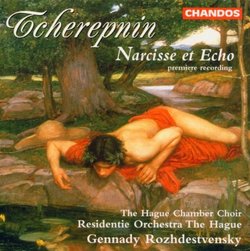| All Artists: Nikolai N. Tcherepnin, Gennady Rozhdestvensky, Hague Residentie Orchestra, Hague Chamber Chorus Title: Tcherepnin: Narcisse et Echo / Rozhdestvensky, Hague Residentie Orchestra Members Wishing: 0 Total Copies: 0 Label: Chandos Original Release Date: 1/1/2000 Re-Release Date: 1/19/1999 Genre: Classical Style: Symphonies Number of Discs: 1 SwapaCD Credits: 1 UPC: 095115967027 |
Search - Nikolai N. Tcherepnin, Gennady Rozhdestvensky, Hague Residentie Orchestra :: Tcherepnin: Narcisse et Echo / Rozhdestvensky, Hague Residentie Orchestra
 | Nikolai N. Tcherepnin, Gennady Rozhdestvensky, Hague Residentie Orchestra Tcherepnin: Narcisse et Echo / Rozhdestvensky, Hague Residentie Orchestra Genre: Classical
|
Larger Image |
CD Details |
CD ReviewsA must have premiere recording of a vivid work. David A. Hollingsworth | Washington, DC USA | 06/19/1999 (5 out of 5 stars) "After Tchaikovsky & Glazunov and before Stravinsky, the Soviets, and the French, Nikolai Tcherepnin (1873-1945) made quite a significant contribution to the development of the Russian ballet. But he was quite an overshadowed figure, in large part due to the success of Stravinsky & Nikolay's son, Alexander Tcherepnin and also due to modernist trends that became prevalent by the early 20th century. That's too bad, for if anything, Nikolai Tcherepnin was quite forward looking in his own right: the foretaste of his ballet "Narcisse et Echo" (1911) to Ravel's "Daphnis et Chloe" (1912) is beyone mere notice.
Critics would often cite Rimsky-Korsakov & Tchaikovsky as forces of influences behind Tcherepnin's music. And this is true in his earlier fantastic ballet "Le Pavillon d'Armide" (1909). But (and there is a but), his later ballet "Narcisse et Echo" shows the composer a bit ahead of his times: something Bax, Ireland, or Catoire could perhaps relate to. Moreover, the idiom is not at all far from the impressionistic musical worlds of Debussy, Ravel, & the youthful Roussel (listen, for instance, to Roussel's First Symphony "Le poème de la forêt" and you'll see what I mean). Moreover, though Tcherepnin's language is more or less cosmopolitan in vein (sometimes more so than Tchaikovsky or even Glazunov and Arensky), his sense of color and story-telling is hardly less striking. And even though "Narcisse et Echo" employs a huge orchestra, Tcherepnin uses it with upmost imagination & flair. Needless to say, "Narcisse et Echo" is no minor work. And needless to say, the guy knew very well what he was doing. Gennadi Rozhdestvensky & his ensembles (the Residentie Orchestra The Hague and the Hague Chamber Choir) seem to concur, for they perform this ballet with vivid imagination and compelling artistry throughout. Rozhdestvensky's tempo is perfectly judged, yet with the pictorialism that sticks to the conscious and the subconscious. And a recording sound must support this enterprising undertaking with complete spaciousness and clarity. And these attributes are what we're getting from Chandos (as usual). Also, the overall presentation is nicely complemented by Philip Taylor's admirable annotations. So, in closing, many thanks to all involved in this venture. To say that this album is recommended, with all the warmth, grace, and enthusiasm possible may seem rather superfluous, for the album speaks for itself. And nicely so I shall add!" |

 Track Listings (10) - Disc #1
Track Listings (10) - Disc #1